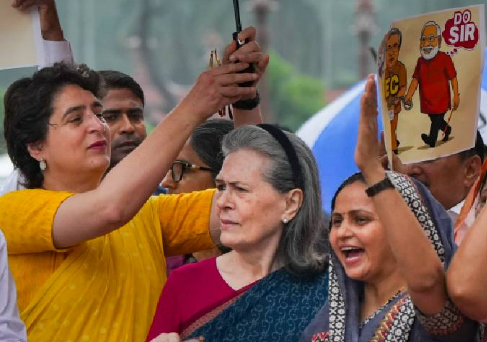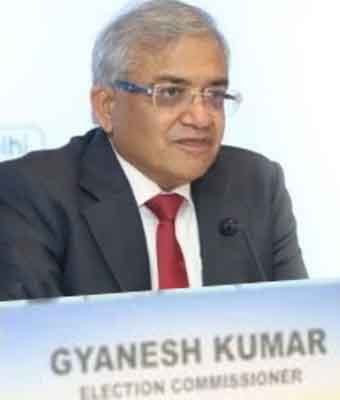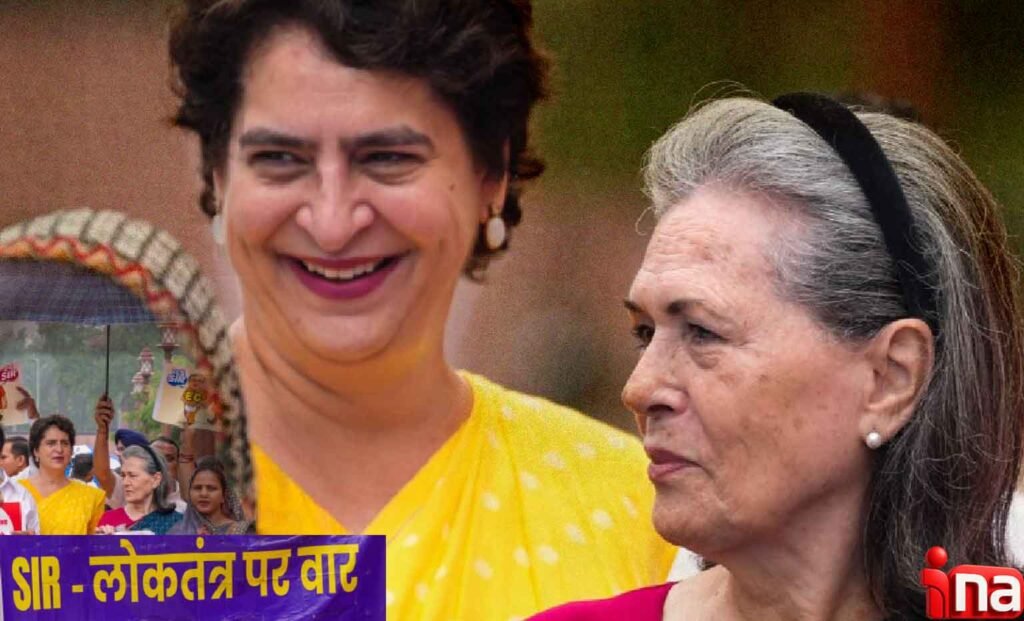As the INDIA bloc takes to the streets against the Special Summary Revision (SIR) of electoral rolls, questions arise about voter suppression, political timing, and the integrity of India’s democratic process.
As the INDIA bloc intensifies its protests against the Special Intensive Revision (SIR) of electoral rolls in Bihar, a fierce debate unfolds in Parliament and across the country. At the heart of this political storm lies a crucial question: Is the voter list revision a genuine administrative exercise—or a veiled attempt at voter suppression ahead of key elections?
The alliance accuses the EC of orchestrating a systematic disenfranchisement of millions, especially vulnerable voters, through a hurried process under the slogan: “Our Vote, Our Right, Our Fight.”

Why INDIA Bloc Is Taking to the Streets: Political, Legal, and Social Stakes
Leaders from the INDIA alliance—including Congress, RJD, DMK, CPI, CPI‑ML, TMC, JMM, AIMIM, and other regional outfits—have declared the Special Intensive Revision (SIR) in Bihar as a politically orchestrated move. Their slogan, “Our Vote, Our Right, Our Fight”, encapsulates their core argument: that the voter list revision exercise is disproportionately targeting the marginalized and weakening electoral fairness.
The Special Intensive Revision (SIR)
Launched by the Election Commission of India (ECI) on 25 June 2025, the SIR is a large-scale verification process aimed at cleaning up voter lists by:
- Removing duplicate, outdated, or ineligible voter entries
- Validating citizenship status under the Representation of the People Act, 1950
- Confirming address and identity of electors via physical verification
Though the ECI asserts this is standard procedure, the SIR in Bihar has triggered unique outrage due to:
- Its limited one-month window amid heavy monsoons (submission deadline: 25 July)
- Restrictive documentation norms: Only 11 government-issued documents are valid (excluding Aadhaar and Voter ID, surprisingly)
- Its implementation in only one state—Bihar, without clarity on a national rollout
- Its potential to disenfranchise over 2 crore voters, especially from Dalit, Muslim, poor, migrant, and rural communities
What Is SIR and Why It Triggered Controversy
The Election Commission announced the launch of a nationwide Special Intensive Revision of electoral rolls, with Bihar designated as a pilot. The EC justified the initiative as part of its constitutional mandate to ensure roll accuracy—identifying and removing outdated, duplicate, or ineligible names and confirming citizenship status under the Representation of the People Act.
However, soon after the launch:
- Approximately 98,000 Booth Level Officers (BLOs) began door‑to‑door enumeration in some 38 districts, distributing forms to over one crore households.
- Only 11 specified government-issued documents were accepted; crucially, Aadhaar cards and voter ID cards were excluded, raising suspicion and confusion.
- The deadline to submit forms was 25 July, giving people barely a month to arrange required documentation under difficult monsoon conditions.
As SIR proceeded, opposition leaders raised deep concerns:
- Tejashwi Yadav (RJD) said: “We smell a big conspiracy in this decision… How can the electoral roll of eight crore voters be updated in just one month, especially when monsoon floods are rampant across 73% of Bihar?” He warned that once names are removed, welfare benefits like pension, rations, or scholarships may follow suit.
- Pawan Khera (Congress) described the process as “a dacoity of voting rights”—a calculated assault on democratic rights.
- Dipankar Bhattacharya (CPI‑ML) emphasized that this was antithetical to the Constitution: “It is supposed to be voters who elect the government—here the government is choosing the voters.”
Opposition leaders also questioned why similar roll revisions were not conducted in prior elections and why current roll versions were not accepted for the upcoming polls. They termed the exercise a “Vote‑Bandi”—systematic deletion aimed at electoral gain.
Legal and Political Responses
Multiple opposition parties and civil society organizations lodged petitions in the Supreme Court, challenging the legitimacy of SIR—including its timeline, documentation rules, and hurried implementation.

The SC scheduled hearings beginning 12 August 2025, with justices warning they would order relief if large-scale exclusions were verified.
Meanwhile, the EC maintained that SIR was both legal and necessary. Chief Election Commissioner Gyanesh Kumar argued that parliamentary debate on SIR was inappropriate because the process is carried out independently under constitutional authority and is standard practice in many past elections.
Timeline of Key Events and Escalating Protests
Late June–Early July
- 27 June: INDIA bloc holds joint press conference to denounce SIR, citing risk to marginalized voters and migrants. They pledge to resist the EC’s alleged manipulation through public and legal actions.
- 1–9 July: The INDIA bloc launches a campaign across Bihar, including a “Bihar Bandh” and “chakka jam” in Patna. Congress and RJD workers burn tires, block roads, halt trains and lead mass marches highlighting disenfranchisement concerns.
July 22–25
- INDIA MPs visiting Parliament tear SIR posters and discard them in symbolic bins inside the House, demanding immediate rollback and institutional debate.
- 23–24 July (Monsoon Session): Protesters gather outside Makar Dwar—Parliament’s main entrance—displaying banners reading “SIR – Loktantra par Vaar” (Attack on democracy), carrying slogans like “Save democracy”, “Stop vote‑bandi”. Key leaders including Sonia Gandhi, Priyanka Gandhi Vadra, Mallikarjun Kharge, Rahul Gandhi, and MPs from RJD, DMK, TMC, CPI, JMM, and Left parties participate.
- Repeated disruptions result in no legislative business for the first four days, with Lok Sabha functioning cumulatively for barely minutes (e.g. just 18 minutes on one day, before adjournments restart).
- Speaker Om Birla urges decorum but protests persist. In Rajya Sabha, Deputy Chairman Harivansh chairs amid uproar; in Lok Sabha, protests follow the unexpected resignation of Vice President Jagdeep Dhankhar.
Late July–Early August
- INDIA bloc intensifies actions with a nationwide march planned to the EC headquarters in New Delhi.
- 31 July: Rahul Gandhi announces a 17-day campaign across Bihar starting 9 August, aimed at mobilizing public resistance to SIR ahead of elections.
- Meanwhile, the EC issues draft rolls on 1 August, confirming that names for persons who submitted enumeration forms will remain—yet concerns remain about those excluded.
August 2–5
- 2 August: Lok Sabha adjourned twice in one day; opposition floor leaders formally write to Speaker Om Birla demanding urgent debate on SIR.
- 3 August: Opposition prepares to escalate even further; BJP responds by declaring SIR debate “off‑limits” in Parliament.
- 5 August: Lok Sabha is stalled again as protests continue over deletion of 6.5 million voter names. Opposition demands clarity on process, documents, and cut‑offs. Parliamentary Affairs Minister Kiren Rijiju warns government may need to pass legislation without debate if disruptions persist—referring specifically to stalled bills like the National Sports Governance and Anti‑Doping Amendment proposals.
INDIA Bloc’s Parliament Protest on Today’s Agenda
On 5 August, INDIA bloc leaders will gather at 10:00 am in the Parliament Library Building, at the office of the Leader of Opposition (LoP) in the Rajya Sabha. Following that, at 10:30 am, MPs will stage a protest outside Makar Dwar.
Under the banner “Our Vote, Our Right, Our Fight”, they will demand:
- Immediate rollback of SIR in Bihar.
- Full-scale parliamentary debate.
- Legal and procedural accountability from the Election Commission.
This protest coincides with intense gridlock in both Houses—nothing substantial has been conducted in Parliament since these protests began, and two key bills remain pending.
At Stake: Democracy, Voter Rights, and Political Fallout
The stakes could not be higher:
- Democratic Integrity: Could an administrative oversight or unverified data revision impact millions of voters?
- Marginalized Communities: Bihar’s poorest, including migrants and those without legal documentation, face disproportionate risk.
- Political Equity: The INDIA bloc believes the ruling NDA is manipulating institutional processes to entrench its position before the Bihar polls.
- Judicial Oversight: Supreme Court intervention beginning 12 August could reshape the timeline and outcome of the revision.
Who Stands to Lose?
- Sociopolitical observers highlight that Bihar—India’s third most populous state, with a significant population of migrants, backward castes, minorities, and rural poor—is particularly vulnerable to disenfranchisement under rigid norms.
- Over 6.5 million voters are reportedly at risk of deletion as per internal EC notes.
- Many citizens lack birth certificates, electricity bills, or land records—documents now required under SIR.
- Mass illiteracy and displacement (particularly in flood-affected districts) further complicate access to the revision process.
What Comes Next?
The coming days are crucial:
- 12 August: Supreme Court begins hearing challenges to the legality of SIR.
- 9 August onward: Rahul Gandhi leads public outreach campaign across Bihar.
- August-end: Final electoral rolls expected from the EC.
Much depends on how the EC, Parliament, and the judiciary respond to growing public scrutiny. The balance between administrative efficiency and democratic inclusiveness is under sharper focus than ever.
A Turning Point for Electoral Trust
In the lead-up to one of India’s most politically significant state elections, SIR has become more than a voter list update—it is a litmus test for institutional balance, public trust, and democratic health.
If the EC responds substantively to opposition concerns and allows transparent debate—whether in Parliament or through judicial review—it may stem accusations of bias. If not, the INDIA bloc’s campaign, legal recourse, and public protests could reshape political dynamics in Bihar and beyond.
At stake is not just eight crore voter names but the principles of inclusion, fairness, and the right to be heard in a true democracy.


